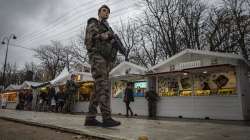This new framework can tell about future terrorist attacks, claim researchers
New York: Researchers have now developed a new framework which can accurately predict future terrorist attacks by recognizing patterns in past attacks. According to the researchers at Binghamton University, State University of New York by

New York: Researchers have now developed a new framework which can accurately predict future terrorist attacks by recognizing patterns in past attacks.
According to the researchers at Binghamton University, State University of New York by using data on more than 140,000 terrorist attacks between 1970 and 2014, they have developed a framework that calculates the relationship between select features of terrorist attacks (e.g. attack time, weapon type).
Government agencies are having difficulty tracking potential attacks, since terrorists have developed new ways to communicate besides social media, researchers said.
Binghamton University PhD candidate Salih Tutun developed a framework that calculates the relationship between select features of terrorist attacks (e.g. attack time, weapon type).
Researchers Salih Tutun and Mohammad Khasawneh from Binghamton University said that the framework identifies the characteristics of future terrorist attacks by analysing the relationship between past attacks,
Comparing the results with existing data shows that the proposed method was able to successfully predict most of the characteristics of attacks with more than 90 percent accuracy, they said.
These results support the previous findings that terrorists tend to emulate the behaviour of other terrorist groups and learn from their mistakes and successes, researchers said.
"They are learning, but they do not know they are learning. If we do not have social media or other technologies, we need to understand the patterns. Our framework works to define which metrics are important," said Tutun.
"Based on this feature, we propose a new similarity (interaction) function. Then we use the similarity (interaction) function to understand the difference (how they interact with each other) between two attacks," he said.
"For example, what is the relationship between the Paris and the 9/11 attacks? When we look at that, if there is a relationship, we are making a network. Maybe one attack in the past and another attack have a big relationship, but nobody knows," he added.
Previous studies have focused on understanding the behaviour of individual terrorists (as people) rather than studying the different attacks by modelling their relationship with each other, researchers said.
Terrorist activity detection focuses on either individual incidents, which does not take into account the dynamic interactions among them; or network analysis, which gives a general idea about networks but sets aside functional roles of individuals and their interactions, they said.
"Predicting terrorist events is a dream, but protecting some area by using patterns is a reality. If you know the patterns, you can reduce the risks. It is not about predicting, it is about understanding," said Tutun.
(With Agency input)